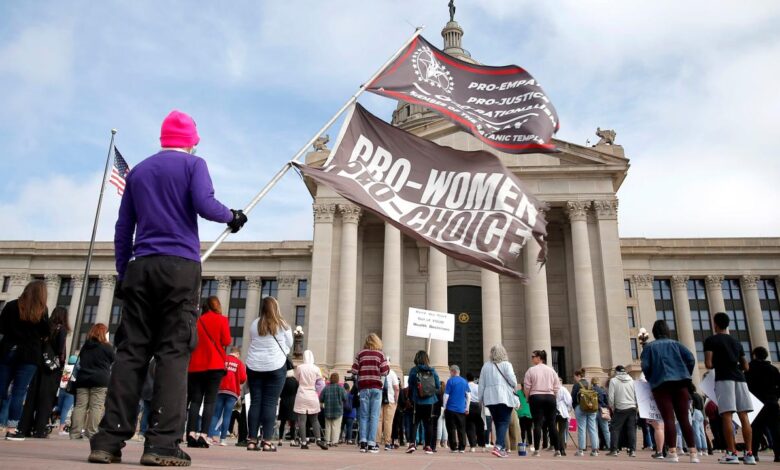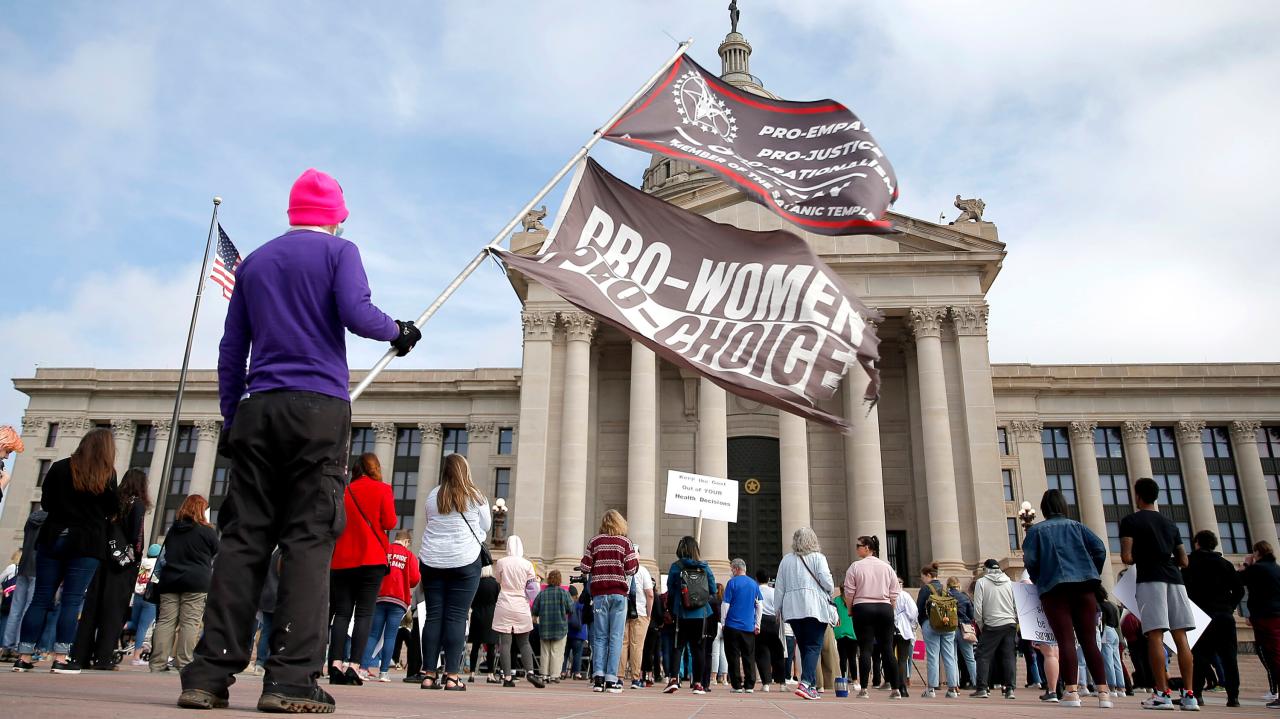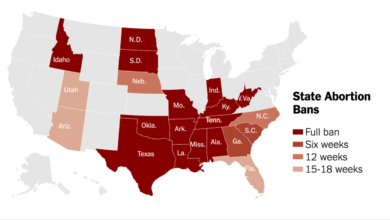
Oklahoma Passes Most Extreme Abortion Ban in the US
The most extreme abortion ban in the country was just signed into law in oklahoma – Oklahoma has just passed the most extreme abortion ban in the country, effectively banning abortion after six weeks of pregnancy. This law, signed by Governor Kevin Stitt, ignores the fundamental rights of women and has ignited a fierce debate about the future of reproductive healthcare in the United States.
This law, which is one of the most restrictive in the nation, outlaws nearly all abortions in the state. It allows for exceptions only in cases of medical emergency, and not for cases of rape or incest. This means that women who are pregnant as a result of these traumatic experiences will be forced to carry their pregnancies to term, despite the significant physical, emotional, and financial burdens this can impose.
Impact on Access to Abortion Care
The recent enactment of the most extreme abortion ban in Oklahoma has profound implications for individuals seeking abortion care in the state, potentially creating a cascade of challenges and obstacles. This law, effectively criminalizing all abortions except in cases of medical emergency, could significantly hinder access to safe and legal abortion services.
Potential Consequences for Individuals
The new law’s impact on individuals seeking abortion care is likely to be multifaceted, with potential consequences ranging from significant delays to increased financial burdens and heightened legal risks.
- Increased Travel Time and Costs:Individuals seeking abortion care will be forced to travel to other states with more permissive abortion laws, adding significant travel time and expense. This will disproportionately impact low-income individuals and those residing in rural areas who may lack the financial resources or transportation options for out-of-state travel.
For example, a woman living in rural Oklahoma may have to travel hundreds of miles to access abortion services in neighboring states like Kansas or Colorado, incurring substantial costs for transportation, lodging, and childcare.
- Limited Availability of Providers:The law could lead to a decrease in the number of healthcare providers offering abortion services in Oklahoma, further restricting access. This is because healthcare providers may be hesitant to provide abortion services due to the legal risks and potential penalties associated with the new law.
Additionally, some providers may choose to relocate to states with more supportive abortion laws, leaving fewer options for individuals in Oklahoma.
- Increased Risk of Legal Action:Individuals seeking abortion care in Oklahoma may face increased legal risks, as the law criminalizes the procedure. This could involve potential criminal charges or civil lawsuits against individuals, providers, and even those assisting with travel or financial support for abortion care.
Impact on Healthcare Providers
The Oklahoma law presents a significant challenge for healthcare providers, raising concerns about their legal and ethical obligations.
It’s hard to believe that while the most extreme abortion ban in the country was just signed into law in Oklahoma, we’re also facing a crisis on the roads. The dream of the open road collides with the reality of 5 a gallon gas , making it impossible for many to even consider a road trip.
It’s a reminder that while some are focused on controlling women’s bodies, others are struggling to simply get around.
- Legal Liability:The law places healthcare providers in a precarious position, potentially exposing them to criminal prosecution and civil liability for providing abortion services. This could deter providers from offering abortion care, leading to a shortage of providers in the state.
- Ethical Dilemmas:The law creates ethical dilemmas for healthcare providers who may be compelled to prioritize their legal obligations over the best interests of their patients. For instance, a provider may be obligated to report a patient seeking abortion care to law enforcement, even if it goes against their ethical principles and undermines patient confidentiality.
- Limited Access to Care:The law’s impact on healthcare providers could further restrict access to abortion care, as fewer providers are willing to offer the service due to legal and ethical concerns. This could lead to longer wait times for appointments, increased travel distances for patients, and a more limited range of abortion care options available.
Comparison to Other Abortion Restrictions
The Oklahoma law stands out as one of the most restrictive abortion bans in the United States, exceeding the severity of many other abortion restrictions. While other states have implemented various restrictions, such as parental notification requirements, mandatory waiting periods, and ultrasound mandates, Oklahoma’s law goes further by criminalizing all abortions except in cases of medical emergency.
This makes it more stringent than laws in states like Texas, which have implemented bans after six weeks of pregnancy.
Legal Challenges and Future Prospects
The Oklahoma law, which effectively bans all abortions, has ignited a legal battle that is likely to reach the Supreme Court. The law’s constitutionality will be challenged on several grounds, raising crucial questions about the future of abortion rights in the United States.The Oklahoma law faces significant legal challenges, with arguments focusing on its potential violation of the right to privacy, the right to bodily autonomy, and the right to access healthcare.
These arguments draw upon existing legal precedents and constitutional principles, including the landmark case of Roe v. Wade.
Dobbs v. Jackson Women’s Health Organization and Its Implications, The most extreme abortion ban in the country was just signed into law in oklahoma
The Supreme Court’s decision in Dobbs v. Jackson Women’s Health Organization, which overturned Roe v. Wade, provides a crucial context for understanding the legal challenges facing the Oklahoma law. The Dobbs decision held that the Constitution does not confer a right to abortion, leaving the regulation of abortion to individual states.
This decision has emboldened states like Oklahoma to enact restrictive abortion laws, while also sparking a national debate on the future of abortion rights.
Potential Impact on Other States and the National Conversation
The Oklahoma law serves as a model for other states seeking to restrict abortion access. The law’s success, or failure, could have a significant impact on the national conversation surrounding abortion rights. If the law is upheld, it could encourage other states to enact similar bans, potentially leading to a nationwide curtailment of abortion access.
Conversely, if the law is struck down, it could strengthen the legal arguments for abortion rights and embolden advocates to challenge other restrictive laws.
The news about Oklahoma’s most extreme abortion ban is truly disheartening. It feels like we’re constantly fighting for basic human rights, and it’s exhausting. Sometimes I feel like I just want to scream into the void, but then I remember all the amazing teachers out there who are fighting for their students every day.
If you’re feeling overwhelmed, check out this helpful resource: ask weareteachers help i dont want to job share anymore. We need to support each other, and remember that even in the darkest of times, there’s still hope for a brighter future.
It’s important to keep fighting for what’s right, even when it feels impossible.
Public Opinion and Social Impact
The Oklahoma law has sparked widespread public debate, drawing reactions from diverse stakeholders with varying perspectives on its implications. This law has ignited a storm of public opinion, with healthcare providers, patients, and advocacy groups expressing their views on its potential consequences.
The law’s impact extends beyond legal ramifications, potentially influencing the social and economic landscape of the state.
Public Reaction and Perspectives
The law has been met with significant opposition, with many expressing concerns about its potential impact on women’s health and access to healthcare.
The most extreme abortion ban in the country was just signed into law in Oklahoma, effectively outlawing the procedure after six weeks of pregnancy. While the political and social ramifications of this decision are vast, it also raises a point about leadership that everyone, even those not involved in the abortion debate, should consider.
Elon Musk’s controversial return-to-office plan, as discussed in this article , emphasizes the importance of clear and direct communication, a lesson that would serve Oklahoma’s lawmakers well as they face the consequences of their actions.
- Healthcare providers have voiced concerns about the law’s potential to deter them from providing essential medical care, fearing legal repercussions. The law’s stringent provisions could lead to a chilling effect, making providers hesitant to offer services that could be construed as aiding or abetting abortion, even in cases of medical emergencies.
- Patients seeking abortion care have expressed anxieties about the law’s impact on their ability to access necessary healthcare services. The law’s restrictive nature could force them to travel long distances to obtain care, potentially jeopardizing their health and well-being.
- Advocacy groups have condemned the law, arguing that it is a blatant violation of women’s rights and bodily autonomy. They have highlighted the law’s potential to disproportionately impact marginalized communities, including low-income individuals and those living in rural areas, who may lack the resources to travel for care.
Potential Social and Economic Impacts
The law’s potential social and economic impacts are multifaceted and far-reaching.
- Maternal health: The law’s restrictions on abortion access could have significant consequences for maternal health. Women who are unable to access safe and legal abortion care may resort to unsafe methods, putting their lives at risk. The law could also lead to an increase in unintended pregnancies, potentially straining healthcare resources and exacerbating existing health disparities.
- Healthcare disparities: The law’s impact is likely to be felt most acutely by marginalized communities, exacerbating existing healthcare disparities. Low-income individuals, people of color, and those living in rural areas may face significant barriers to accessing abortion care, further limiting their reproductive choices.
- Economic well-being: The law’s economic impacts could be substantial. Women who are unable to access abortion care may face financial burdens due to unplanned pregnancies, potentially impacting their education, employment, and overall economic well-being. The law could also have negative consequences for the state’s economy, as it may discourage businesses and individuals from relocating to Oklahoma.
Impact on the Broader Debate
The Oklahoma law has amplified the broader debate surrounding reproductive rights and women’s health in the United States. The law’s extreme nature has sparked national outrage, with many viewing it as a dangerous precedent that could inspire similar legislation in other states.
The law has also highlighted the need for federal protections for abortion rights, as the Supreme Court’s decision in Dobbs v. Jackson Women’s Health Organization has opened the door for states to severely restrict or ban abortion access.
Ethical Considerations and Moral Arguments: The Most Extreme Abortion Ban In The Country Was Just Signed Into Law In Oklahoma

The Oklahoma abortion ban, one of the most restrictive in the nation, presents a complex ethical landscape. It raises profound questions about the rights of pregnant individuals, the role of the state in regulating abortion, and the potential consequences for individuals and communities.
Ethical Arguments Surrounding the Oklahoma Law
The ethical arguments surrounding the Oklahoma law are deeply intertwined with the fundamental rights of pregnant individuals and the role of the state in regulating abortion.
- The Right to Bodily Autonomy:Supporters of abortion rights argue that the law violates the fundamental right to bodily autonomy. They contend that women have the right to make decisions about their own bodies, including whether or not to continue a pregnancy. They believe that the state should not interfere in these deeply personal decisions.
- The Right to Privacy:The right to privacy, as established in various legal precedents, is often cited as a cornerstone of abortion rights. Supporters argue that the law infringes on this right by forcing individuals to disclose their reproductive choices to the state.
- The State’s Role in Regulating Abortion:Opponents of the law argue that the state’s role in regulating abortion should be limited, focusing on ensuring safe and legal procedures while respecting the rights of individuals. They contend that the law goes beyond the scope of legitimate state interests and intrudes into personal medical decisions.
- Potential Consequences for Individuals and Communities:Supporters of abortion rights highlight the potential consequences of the law for individuals and communities. They argue that the law will disproportionately impact low-income women and women of color, who may lack access to resources and support. They also express concerns about the potential increase in unsafe abortions and the negative impact on women’s health and well-being.
Moral Perspectives on Abortion
The moral perspectives on abortion are diverse and often deeply held.
- Pro-Choice Perspective:Pro-choice advocates believe that women have the right to choose whether or not to terminate a pregnancy. They argue that the decision should be left to the individual, considering their personal circumstances, beliefs, and values. They emphasize the importance of women’s autonomy and control over their bodies and lives.
- Pro-Life Perspective:Pro-life advocates believe that abortion is morally wrong and should be illegal. They argue that human life begins at conception and that abortion is the taking of an innocent human life. They prioritize the protection of the unborn and advocate for alternatives to abortion, such as adoption.
Impact on the Relationship Between Individuals and the State
The Oklahoma law raises significant questions about the relationship between individuals and the state.
- Government’s Role in Protecting Individual Liberties:The law raises concerns about the government’s role in protecting individual liberties. Some argue that the law represents an overreach of state power, interfering with personal medical decisions and undermining the fundamental right to privacy.
- Government’s Role in Promoting Public Health:The law also raises questions about the government’s role in promoting public health. Some argue that the law will negatively impact women’s health by restricting access to safe and legal abortion, potentially leading to an increase in unsafe abortions and complications.
Last Recap
The Oklahoma abortion ban is a significant setback for reproductive rights in the United States. It’s a stark reminder of the ongoing fight for women’s bodily autonomy and access to safe and legal abortion care. This law, along with similar legislation being passed in other states, is a direct consequence of the Supreme Court’s decision in Dobbs v.
Jackson Women’s Health Organization, which overturned Roe v. Wade. The future of abortion rights in the United States is uncertain, and the fight for reproductive justice is more important than ever.






